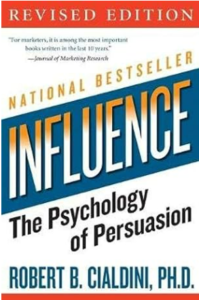Reading Notes For:


Part 6: Authority
This is a summary of my reading notes from Influence by Robert Cialdini.
And now we are going to dive even deeper into the intriguing world of authority, symbols, and the strategies we can employ to navigate this complex terrain effectively. By expanding upon the lessons we’ve already learned, we’ll uncover even more insights into how authority influences our choices and decisions.
We’ve explored how symbols of authority, like titles and attire, can lead us to comply without question. But now, let’s take a closer look at how we can safeguard ourselves against unwarranted influence.
The first question we must ask ourselves when confronted with an authority figure’s influence attempt is a powerful one: “Is this authority truly an expert?” This question serves as a guiding light, focusing our attention on the authority’s credentials and the relevance of those credentials to the specific topic at hand. It encourages us to distinguish between those who possess genuine expertise and those who rely on mere symbols of authority.
By asking this question, we steer clear of the trap of automatic deference. It reminds us to bypass superficial appearances and instead concentrate on the substance of an individual’s knowledge and experience. This shift in perspective empowers us to discern between authorities who genuinely possess valuable insights and those who do not.
But let’s take it a step further. Suppose we determine that the authority in question is indeed a relevant expert. Before we surrender to their influence, we should pose a second crucial question: “How truthful can we expect the expert to be here?” This question acts as a safeguard, helping us evaluate the authority’s trustworthiness and motivations.
Research from various corners of the world has consistently shown that we tend to place more trust in experts who appear impartial, without hidden agendas. By contemplating how an expert might benefit from our compliance, we equip ourselves with an additional layer of protection against undue influence. It encourages us to critically assess the credibility of the authority.
In our quest to evaluate trustworthiness, it’s important to be aware of a subtle tactic frequently employed by compliance practitioners – the art of arguing against their own interests. These experts may mention minor shortcomings in their positions or products, seemingly undermining their own case. However, this tactic is often a strategic move. By establishing their basic truthfulness on trivial matters, they enhance their credibility when emphasizing more significant advantages.
This approach isn’t limited to academic or professional contexts; it seeps into everyday life. Take, for example, the realm of restaurants. Behind the scenes, servers often act as compliance agents, knowing that larger bills mean larger tips. Yet, they are also well-versed in the delicate dance of building trust.
Now, let’s explore a fascinating psychological phenomenon known as the “contrast principle.” Imagine perusing a menu and stumbling upon an item priced at a jaw-dropping $3,500. It seems exorbitant, doesn’t it? However, as your eyes scan the menu further, you encounter items priced at a comparatively modest $200. Suddenly, those $200 options appear far more reasonable in comparison. This illustrates how the contrast principle influences our perception of value.
As we conclude our journey into the intricacies of authority and compliance, let’s cement these lessons: When faced with authority figures, symbols, or influence attempts, remember to ask yourself, “Is this authority truly an expert?” and “How truthful can we expect the expert to be here?” By posing these questions, you become a discerning and informed consumer of information. This awareness empowers you to navigate the complex landscape of authority with confidence and critical thinking.
In a world filled with symbols, tactics, and subtle influences, it’s crucial to stay vigilant, remain curious, and always question the information presented to you. Thank you for embarking on this extended exploration of authority and compliance, where knowledge is your greatest shield against undue influence.
